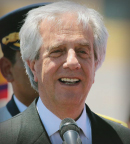In 2006, President of Uruguay Dr. Tabaré Vázquez, a radiation oncologist by profession, enacted comprehensive antismoking legislation, eventually leading Uruguay to become the first country in Latin America to prohibit smoking in enclosed public spaces. His bold action drew the ire of international tobacco giant Philip Morris International; after 6 years of grueling legal battles, which affected the future of multinational jurisprudence, the World Bank ruled in favor of Uruguay, giving President Vázquez a huge victory for his country’s public health. He would continue to champion smoking cessation measures throughout his presidency. Dr. Vázquez died of lung cancer on December 6, 2020. He was 80 years old.

Dr. Tabaré Vázquez
Humble Beginnings
Born on January 17, 1940, the son of an oil worker, Dr. Vázquez grew up in a tin-roofed shack in the working-class La Teja neighborhood of Montevideo. Determined to pull himself out of poverty, he worked odd jobs, selling newspapers, doing carpentry, driving a taxi, and installing commercial windows. Despite the challenging conditions, Dr. Vázquez was a determined and bright student, excelling in science and math. After high school, he passed the nation’s rigorous entrance exams and entered the Universidad de la República Medical School, a competitive 6-year period of lecture and clinical work. During this time, he decided to become an oncologist, motivated largely by the deaths of his sister, brother, and father, all of whom died of cancer.
Dr. Vázquez received his medical degree in oncology in 1972, entered into private practice, and quickly built a national reputation as a radiation oncologist. He also served as Director of the University of the Republic Medical School’s Department of Radiology.
The Call of Politics
Given his early experience with poverty and its effects on the human condition, Dr. Vázquez began to nurture political aspirations as another way, along with medicine, in which he could better the lives of his fellow citizens. His populist philosophy drew him to the left-leaning Frente Amplio coalition; after a hard-fought campaign, the charismatic young activist became the coalition’s first mayor of Montevideo. Because more than 40% of Uruguay’s population lives in Montevideo, the victory established Dr. Vázquez as a new political force. It also represented the left’s first triumph in a national election. Riding his political momentum, Dr. Vázquez became Frente Amplio’s first presidential candidate, running and losing in 1994 and again in a close election in 1999.
In 2004, not to be denied his vision for improving Uruguay, Dr. Vázquez took his third shot at the presidency, this time winning by a convincing margin. The historic significance of the victory was far-reaching, as it was the nation’s first leftist president. It also sent a message to the rest of the regions that the political winds were shifting.
One of President Vázquez’s first acts was to set in motion a $200 million national emergency plan to help the estimated 20% of Uruguayans living in poverty. President Vázquez began a set of initiatives to improve the economy that had faltered for years. He also began the hard task of dealing with the substantial human rights violations that occurred during the military dictatorships in the 1970s and early 1980s.
Like all statesmen bent on making change, Dr. Vázquez’s political career had its ups and downs. He left office in 2010, but 4 years later, he was Frente Amplio’s candidate again, winning the election in convincing manner; however, his second term as President was troubled by a sputtering economy and high unemployment. Despite it all, President Vázquez fought Big Tobacco and won; overhauled the health-care system; and expanded aid for families, children, and the elderly. And popular sentiment agreed that “he never forgot where he came from.”
Scientist and Defender of Human Rights
In August 2019, Dr. Vázquez revealed publicly that he had a malignant lung nodule. Nevertheless, he was determined to finish his last term in office. He ultimately died of lung cancer on December 6, 2020. President Luis Lacalle Pou declared 3 days of national mourning, noting in an address that “Uruguay lost a prominent scientist and a citizen defender of human rights.”
Eduardo L. Cazap, MD, PhD, Founder and first President of the Latin American and Caribbean Society of Medical Oncology, was a close friend and colleague of Dr. Vázquez’s for 35 years. Speaking with The ASCO Post, Dr. Cazap shared his first meeting with Dr. Vázquez in 1985, when they were both fellows of the American Cancer Society.
“We spent 1 month together, visiting the leading cancer centers across the country. That time together sparked 35 years of friendship and fruitful collaborations. Dr. Vázquez was a global leader in cancer control and an undisputed warrior in the fight against tobacco use. One of his biggest achievements came in 2016, when he beat tobacco maker Philip Morris in a landmark international court ruling and greatly expanded his country’s welfare state. In one of his last interviews, he said he wanted to be remembered as a serious and responsible President. He was that and much more. I must say that we have lost an outstanding physician, an intelligent and honest politician, and a true gentleman.”

